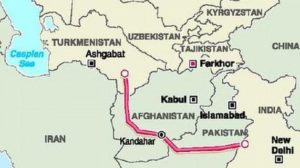
By: Hareem Aqdas 31 August 2018
Pakistan and Afghanistan share similarities in multiple dimensions of history, religion, civilization, and culture. Despite the fact, the two countries have never been successful in establishing a tension free relation. Rather a passive antagonism, mistrust and a blame game form a large part of the ties since the creation of Pakistan for more than half a century. A trust deficit is observed between the two neighbors rather than a cordial relationship.
Tense bilateral relations with Afghanistan have emerged as a significant security and stability issue for Pakistan as it is deemed to be sandwiched between two hostile neighbors from the east and west, India, and Afghanistan respectively.
Afghanistan has been an unstable country with multiple interest groups functioning within it making its emerging outlook uncertain. Afghanistan looks more like a tribal confederacy than a cohesive nation-state. The instability in Afghanistan affects no country as much as it affects Pakistan.
Keeping the scenario as mentioned above in mind, it is vital for Pakistan to try and maintain cordial relations with its neighbor for its strategic benefits. It is essential for Pakistan to initiate a peace process in Afghanistan.
Many attempts have been made in the past to establish better terms with Afghanistan by Pakistan, but most could not bear fruit. In the current scenario, the most reliable possibility of a cordial relation with Afghanistan is the Turkmenistan-Afghanistan-Pakistan-India (TAPI) gas pipeline.
The TAPI gas pipeline is undeniably one of the most significant energy projects of the Asian region. The planned pipeline has a complete length of 1,814 kilometers: 214 km in Turkmenistan, 774 km in Afghanistan, and 826 km in Pakistan to reach Fazilka on the India-Pakistan border. With a total estimation of $9.9 billion, the project is planned for 30 years. The pipeline would have the capability to supply 33 billion cubic meters (bcm) of gas from the world’s fourth-biggest natural gas reserves in Daulatabad of Turkmenistan; with 16 percent going to Afghanistan, Pakistan and India would receive 42 percent each. In addition to receiving 5.22 bcm of gas annually, Afghanistan would get around $400 million each year from transportation income.
The pipeline will run from gas fields in Turkmenistan through Afghanistan and Pakistan to India. It will start from the Galkynysh gas field. In Afghanistan, it will be constructed alongside the Kandahar–Herat Highway in western Afghanistan, and then via Quetta and Multan in Pakistan. The final destination of the pipeline will be the Indian town of Fazilka, near Pakistan-India border.
The pipeline project is undoubtedly crucial for the member countries and the Asian region. Pakistan and India face a shortage of power. The investment will provide a way for fulfilling energy requirements of both nations and can address the shortage of power in both nations. The transit revenue generated will be a startup towards the economic development of the war-stricken Afghanistan. Whereas Turkmenistan, a country primarily based upon its gas reservoirs for its economy, will get a market in South Asia after losing its market with Russia and Iran have seen a backlash in its economy.
China has also vowed to join the projects as an alternative of its fourth gas pipeline from Turkmenistan that formerly was more costly being transited through the Central Asian States. With the help of TAPI, the pipeline will cover a shorter distance from the soil of Pakistan to China through the Karakorum mountain range.
85% of the cost of the TAPI pipeline will be funded by Turkmenistan where the cost is estimated at $10 billion. 5% of the cost shares will be contributed each by Afghanistan, Pakistan, and India. For the development of the region, the Asian Development Bank has also vowed to fund the project. The project is expected to be completed by 2020 or sooner if all the member nations collaborate.
The reliability of this dimension also sets its footing through the fact that it involves the consent of the significant pressure groups dwelling in Afghanistan- the Afghan government, the Taliban and the United States. It is a rare occasion that these significant pressure groups within Afghanistan come on one page of collaboration. The Afghan government realizes the potential of the project to better the economy of Afghanistan has given the go-ahead to the project. The Taliban have also vowed to not interfere in the matter and let the pipeline be set in the Taliban controlled areas without posing harm to it. The US had also agreed in supporting TAPI in 2013 (by the then US Ambassador to Pakistan Richard Olson).
TAPI is a regional energy infrastructure project and will help loosen tensions between the neighboring countries involved due to interdependence. This attribute assures the fact that this investment is to bear fruit for all the nations involved in the project. TAPI is a powerful dimension towards bettering Pakistan-Afghanistan relations. The project can be a way to rebuild Afghanistan into a cohesive nation-state- a dimension through which Pakistan too will benefit (keeping in mind the implications an unstable Afghanistan has over Pakistan). It will also build a sense of trustworthiness among the two countries and will be a factor of interdependence among the nations. The new forming government should take into account the significance and the benefits this project has. It shall be a priority for the new government since it not only ensures the bettering of multilateral relations amongst the countries involved, notably Afghanistan but also will meet the needs of power shortages in Pakistan.
